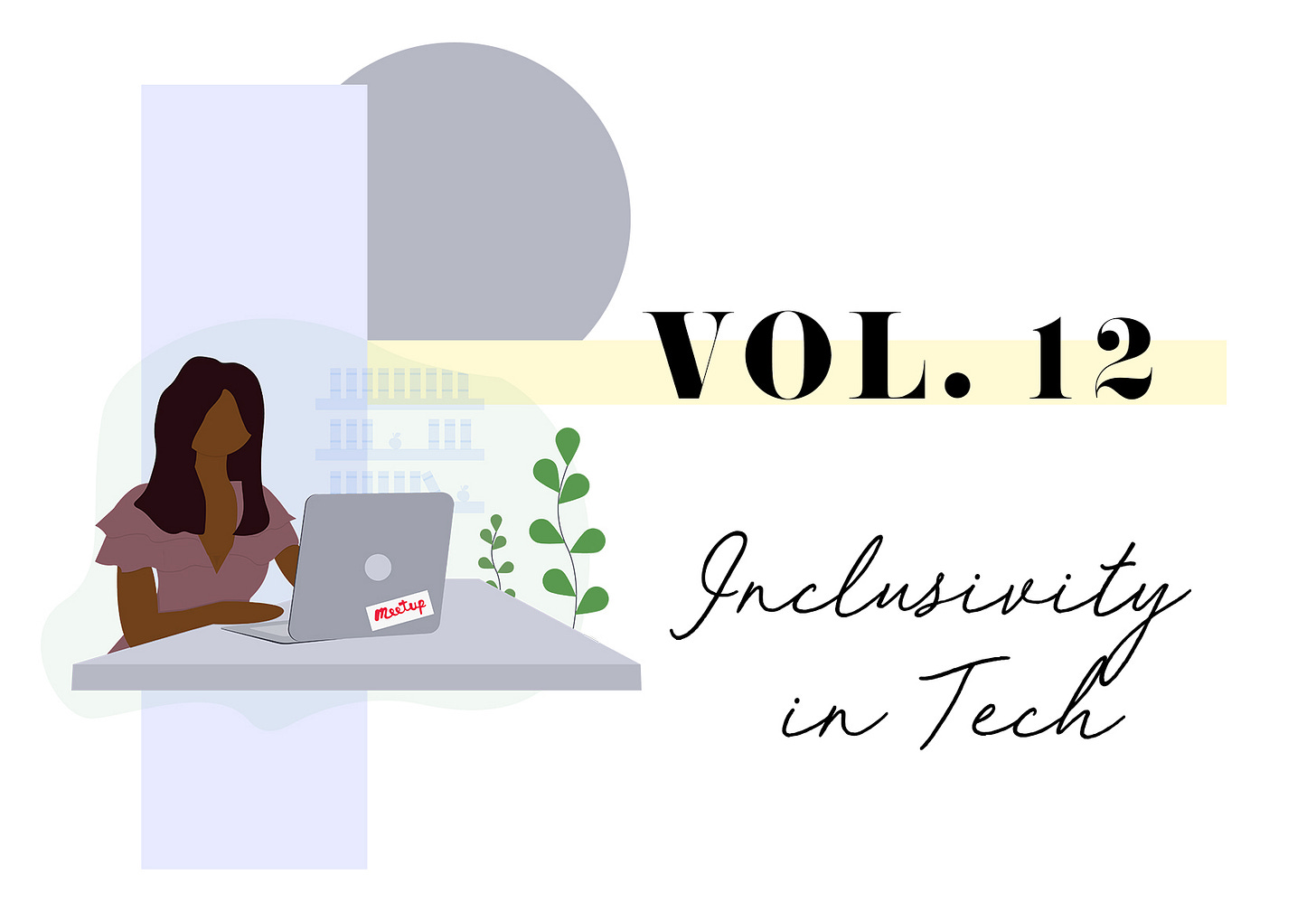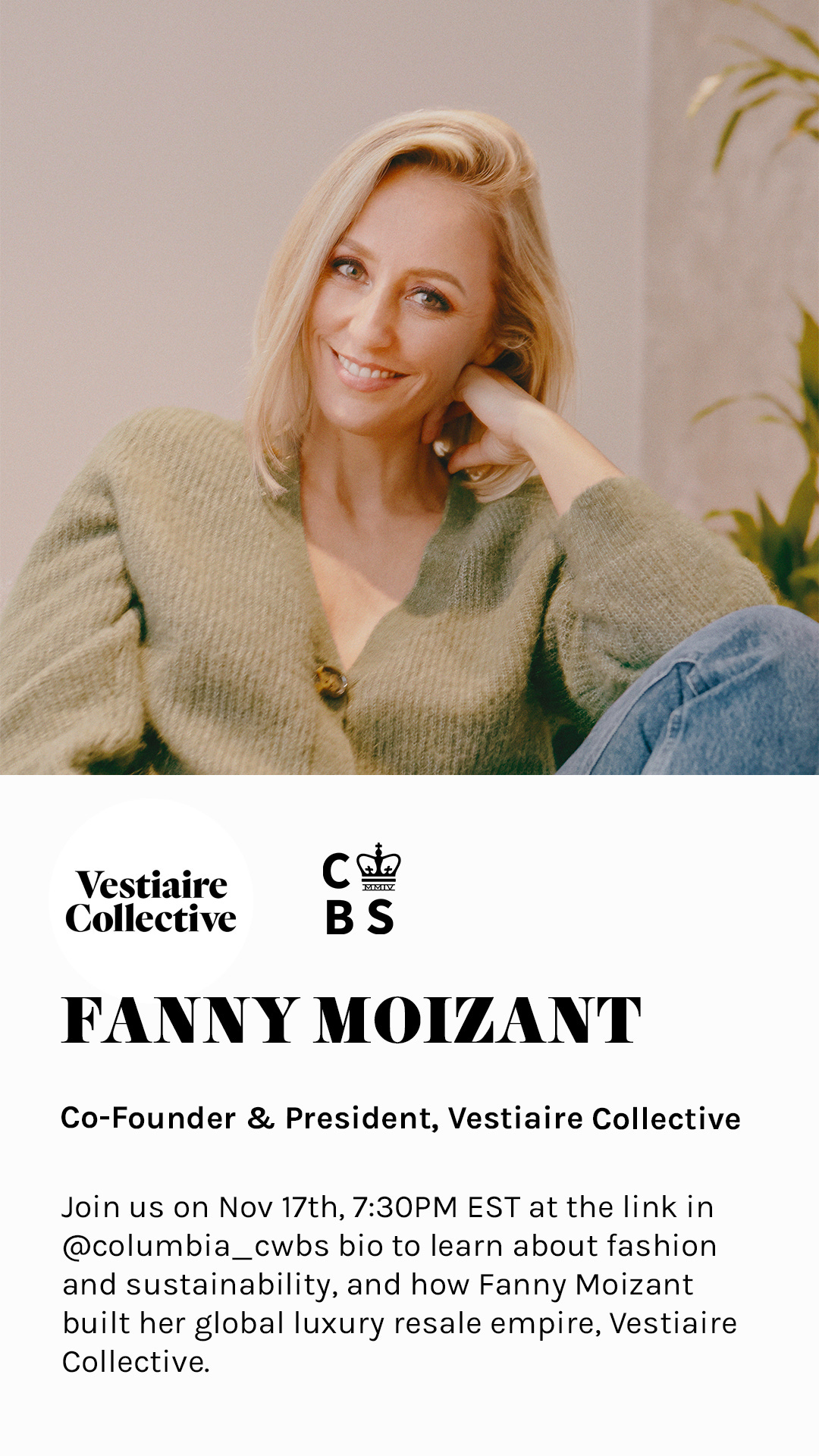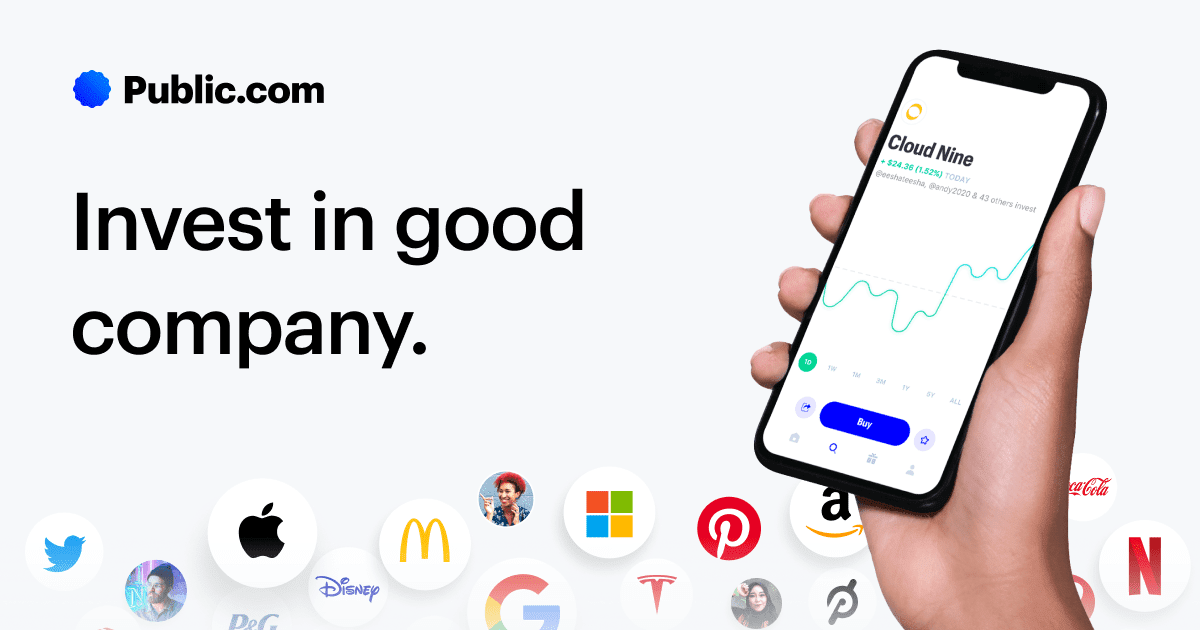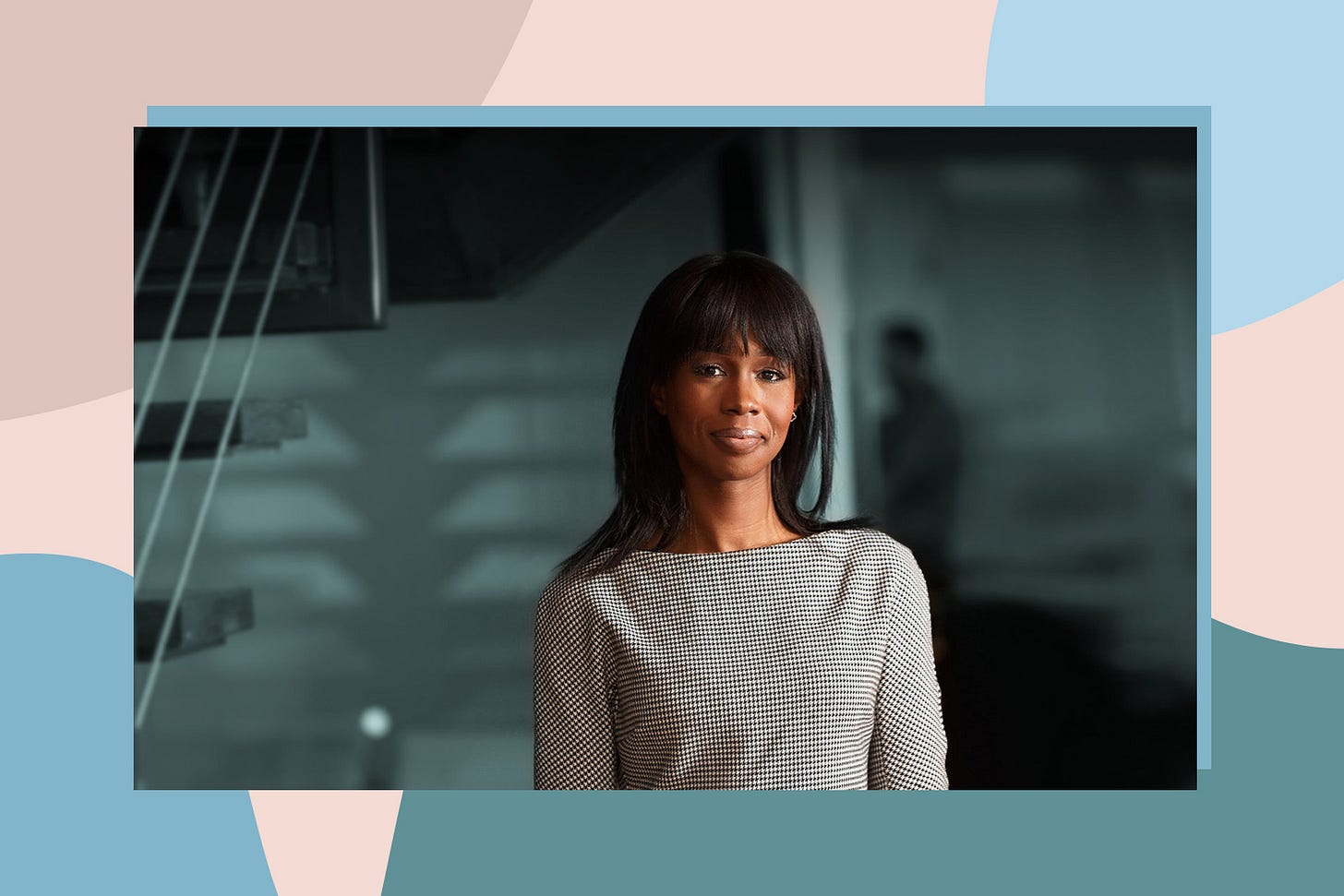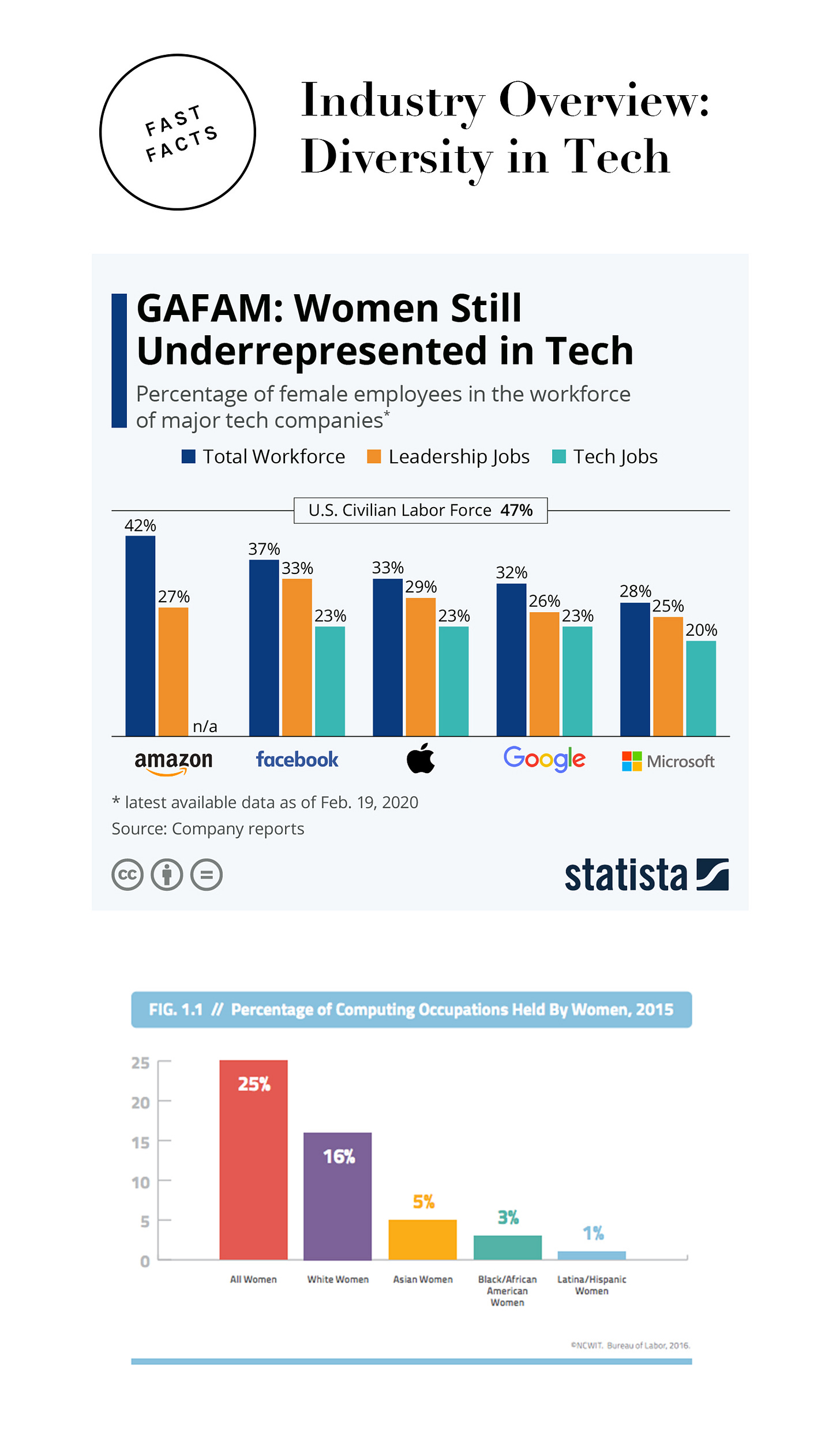Hi CWBS!
This edition of The Scope will focus on diversity and women-focused technology; more specifically, we’re featuring the incredible story of Columbia Business School Alum Asmau Ahmed, a chemical engineer and strategy consultant turned CEO of a venture-funded tech startup turned business and technology leader. Intersectionality throughout all industries in the business world is incredibly important, and CWBS is excited to delve into it in Vol. 12. Happy reading!
Sophia Naqvi, Membership Engagement Chair 2020-2021
Female Founders: Fanny Moizant Co-Founder & President of the Vestiaire Collective • NOV 17, 7:30PM EST
PUBLIC: Invest in good company.
Want to give Public a try? Download the free app and start with $20 worth of stock on us.
Perpetual Political Problems: President Trump is still attempting to prevent the certification of election results declaring Joe Biden as president-elect. Additionally, the Senate majority remains uncertain, resting on two Georgia runoffs set for early January. Learn more.
Social Media Takes a Stand: To prevent confusion over election results, Facebook and Google will continue to ban political ads for at least the next few weeks. Experts say this will push campaigns to use other channels instead. Learn more.
Cuomo’s COVID Curfew: Governor Cuomo has set a 10 pm curfew for bars, restaurants, and gyms in New York State, in an effort to curb further spread of COVID-19. Gatherings at private residences are limited to 10 people as New York COVID cases return to levels not seen since June. Learn more.
ASMAU AHMED OF IAMBLANK
“I believe very fundamentally that as human beings, we place too much emphasis on our differences. I think that if we just interacted with each other, we would find that we have a lot more in common. That was the inspiration behind ‘I am.’ It's about breaking down those barriers and deliberately reaching out to people that are different from you.”
-ASMAU AHMED
Asmau Ahmed is a Senior Strategist that has led corporate strategy and digital innovation for established and emergent organizations in a number of industries including financial services, and consumer retail. She thrives on identifying and growing (digital) companies that have the power to transform the way everyday people do everyday things. With experience in both corporate and entrepreneurial leadership, she has honed her skills in assessing the business viability and risk profile and in leading innovation in enterprise, finance, and technology.
What inspired you to start “I am”?
“I am” is relatively new, but my inspiration is two parts: one is the people that I've been around, and two is just my basic belief. I am a mother of an autistic child, he’s nine years old, and I've found that he struggles with inclusion in the school system, in the neighborhood, in our community. I’m also a black woman––I am Muslim, I am an immigrant, and I have also, in my career and just in life in general, struggled with inclusion.
I believe very fundamentally that as human beings, we place too much emphasis on our differences. I think that if we just interacted with each other, we would find that we have a lot more in common. That was the inspiration behind “I am.” It's about breaking down those barriers and deliberately reaching out to people that are different from you.
What “I am” does is that it diversifies our relationship networks. It makes me aware of how diverse or not diverse my network is, and then it challenges me to diversify my network. We do that with a patent-pending rescue meter that measures diversity across 14 different attributes to start. Now, that list may expand, but currently, we use attributes like demographics or race, gender, sexual orientation, in addition to looking at things like languages spoken at home, regional background, political affiliation, whether or not you have a special needs family member and more. All of those things make up who you and what you are, and both of these––in my mind–-are equal representations of identity. For example, if I am looking for a job somewhere, the fact that I am Black and I am a woman is just as important as the fact that I am a founder and innovator. It affects how I show up at work.
Another thing that inspired “I am” was the fact that today, when I look at the news (and think of like traditional news media and forget social media), we're listening to people that are just like us and that drives me nuts. Honestly, I think that in order to understand the society we live in, we need to be open to understanding different perspectives. We need to listen. So, another feature of “I am” is that we're going to build conversations around news, around anything that people want to talk about. “I am” diversifies the viewpoints we're getting from those conversations. We're inviting people to come open an account and invite at least 10 or more people that are different from them to join the network.
So that was the inspiration: it's just my fundamental belief that we need to break down these barriers, we put too much emphasis on our differences, and we need to diversify our relationship networks.
What skills are essential to creating a business, in particular a tech startup?
I like the fact that you used the word “business” and “tech startup.” In creating the business, you obviously have to make sure that you have a viable business proposition, that you're solving a problem that people are willing to pay for. As engineers and technologists, there is no lack of skill, innovation, or creativity, all of which are of course important. But I think where most people tend to miss the mark is connecting that to making ideas viable business propositions that people would actually pay for. So, I would say the most important skill is connecting your innovation or solution to a business model that's sustainable and viable.
Were there any specific challenges that came with being a Black female leader in the tech and finance industries? And if so, how did you approach the challenges?
In corporate America and America in general, in the startup world, in the business world, there are challenges––the challenge of being a woman, of being Black. And if you're a Black woman, you sit at the intersection of both of those challenges and they are amplified as a result. So, yes, the challenges of inclusion, the challenges of fundraising; the statistics are clear. I think Black women raise thirty-six thousand for every million that our peers raise and thus have many times more chances of failing before we even get off the ground.
A colleague of mine used this example yesterday, and I think it's still apt. Black women tend to be seen as the Robbins' and not the Batman, or tend to be seen in supporting roles, not in lead roles. And that's a problem because over the years, what happens is that you have all qualified Black women working in supporting roles; that's where we are placed or seen, and people expect us to be grateful for the opportunity to be Robin when, we really feel like we have the ability, skillset, drive, experience, and qualifications to be Batman.
So, yes, there are challenges of inclusion, challenges of equal pay, challenges of opportunity, challenges of visibility, the challenges of funding. There are all of those challenges that I think would have been radical to speak about even a couple of months ago, but they are real and they exist.
What are your favorite features on “I am”?
“I am” is still very much in development. We are in a beta mode right now, so I would welcome testers to just come on and help test it and give me feedback. But my favorite feature is the fact that we make it very transparent how diverse an individual or company’s network is, and as a result, how diverse their job pipelines are. So, when people and companies say, for example, “I support gender equality, I support the LGBT community, I support racial equity, I support Black Lives Matter,” are you really interacting with people in these communities? How are you supporting them, tangibly supporting them? Are you adding the pipeline for jobs as a company? Are you, as a person, referring them to roles that you're aware of in your company? Are you dedicated to promoting or employing them, or dedicated to sponsoring them? What tangibly are you doing? So what I love about “I am,” is that it makes that transparent, but it also encourages you. It gives you the tools to do the things that you want to do.
I think people are very well-intentioned, but just don't know where to start. With “I am,” what we do is––I'll use myself as an example. I'm a Black woman. My network right now on social media is mostly Black women. It's not intentional. It's just my family, and my immediate network is mostly Black people. I want to reach out to people different from me. If I am on, what it would do is that it would recommend people that may not be in my immediate circle of people, that still share similar interests, careers, or causes as me. If I say I support Black Lives Matter, I am would find people that are different from me demographically/other attributes who also support Black Lives Matter. From this, you have a connection point: you have a mutual interest that allows you to connect with each other.
What we do beyond that is we have an asking to give everyone that joins a platform. We say, why are you joining? Is it to network? Is it for funding? Is it for small business exposure? And then also, what can you give? On the flip side, can you refer people to your company? Are you looking for a job, or are you just looking to invest in a company, a diverse company? From there, we match people based on their asks and their gives. But the underlying value proposition is that we really encourage diversity, and you’d almost be remiss not to diversify your network.
How can college students get involved, whether it's now or in the future?
Sign up on our website! Don't expect a perfect experience, please. We're still very much building up the experience of how students can help develop this because I’m not looking to develop this on my own. I really am looking to a larger community to give feedback and to help with the direction of where this product will go. We have the diversity meter, but the user experience can change depending on what people want the experience to be. I will encourage college students to sign up, specifically invite people, deliberately invite people that are different from you. Think about people of different races, backgrounds, religions, sexual orientations, who speak different languages, with different socioeconomic backgrounds, of various educational backgrounds. Invite those people into your network and then see, right away, how diverse your network is from the diversity meter. It tells you your network, from a diversity standpoint, on a scale of bad to excellent. I'd like that person to strive to be excellent. Then it gives you the details of why you’re bad or why you are excellent, and it breaks that down specifically by percentages and maps it.
We also calibrated based on representation in society. If society is 50:50 male to female, and your network is only 10 percent female and 90 percent male, you're not doing so well. If society is five percent Muslim and ninety-five percent Christian, and your network is four and a half percent Muslim and the rest are Christian, then you're doing pretty good. We have that calibration so that it's a realistic depiction of what you can expect.
Students should definitely sign up, invite people, and start messaging those around you. Then, most importantly, please give me feedback, give our team feedback. We have a lot of new products in the pipeline that we want to develop, but we're deliberately doing this slowly. We want to first see what people are doing, how they're interacting, and then supporting that relationship, and those behaviors.
Internships
Banking/Finance
Consulting
Tech
Startups
Venture Capital
In the U.S., 8 out of 10 tech industry employees claim they are satisfied with their company’s diversity efforts and 87% have worked in a diverse team in the last year. At the same time, data from the U.S. Equal Employment Opportunity Commission indicate that the tech workforce, especially in tech-specific jobs, remains overwhelmingly white, male, and straight.
Tech firms struggle with the retention of workers from underrepresented communities. In the U.S., women working in tech leave their jobs at a 45% higher rate than men do, often due to corporate culture issues, lack of inclusion, and pay inequity.
Companies in Silicon Valley continue to lag behind. People of color comprise only 5% of Silicon Valley’s workforce while startups are still largely led by white executives, with only 1.4% of executives identifying as BIPOC. For most VC firms, investing in diverse entrepreneurs and hiring BIPOC, women, or people living with disabilities is not a top priority.
According to the U.S. Department of Labor, in March, 60% of those laid off due to the pandemic were women, with Black and Latinx women subjected to job loss at a higher rate. The challenges women are facing now are not new: lack of funding and support has been hindering the success of female entrepreneurs for decades. Women founders acquire only 2% of venture capital dollars, and the number is even lower for BIWOC.
The road through tech remains challenging for the LGBTQ+ community. Industry giants, including Google and Amazon, were accused of condoning discrimination against their LGBTQ+ employees. To make the future of tech more inclusive, firms are implementing exciting projects: for instance, Intuit partnered with the GenderCool Project, an organization that educates about trans and non-binary identities, to create a new mentorship program aimed at transgender youth.
Diversity is the key to success! In its corporate ranking that examined diversity and inclusion in business, The Wall Street Journal concluded that diverse groups, both in terms of identity and career, are more innovative and productive than homogeneous groups. To catch up with other industries, tech companies have allocated much effort into diversifying their workforces and maintaining environments where all employees feel valued. By issuing diversity reports, reforming the recruitment process, and implementing bias training, many enterprises were able to generate more diverse and successful teams.
Key tech companies committed to diversity & inclusion: Cisco, Microsoft, Facebook, Hewlett Packard, Apple, 23andMe, Amazon, IBM, Oracle
MONEYGIRLS: It’s time to run your own money.
MoneyGirls’ goal is to empower all women to maximize their independence, influence, and leadership by giving them the tools and resources necessary to take control of their financial lives. MoneyGirls aims to carry out this mission through the Monday MoneyDrop, a once-a-week newsletter, the MoneyBag, and the MoneyGirls Strategist Network. Get involved here.
HILMA: Upgrade your medicine cabinet. Natural remedies, formulated without doctors. Use code COLUMBIA for 10% off.
EAT BEHAVE: Low-sugar candy that actually tastes like candy. Use code COLUMBIAU for free shipping.
RYLA WELLNESS: Welcome to Ryla! Our plant-based wellness blends help your immune system do its job, keeping you doing whatever you want. Each of our dried shots contain real organic superfoods and 500mg of Vitamin C. Get 15% off with code CWBS15.
PLANT PRESS: For 15% off Plant Press’ CBD-Based drinks, use code COLUMBIA at checkout.
PARADE: For Seamless, smooth, and comfortable underwear. In colors for every day of the week. Just $9. All in sizes from XS to 3X. Get a free pair here.
VESTIAIRE COLLECTIVE: Buy, sell, and share at the most stylish global marketplace for pre-owned luxury and designer fashion! Get $30 off your first app purchase of $150+ using the code CWBS30. Please download the app here.




